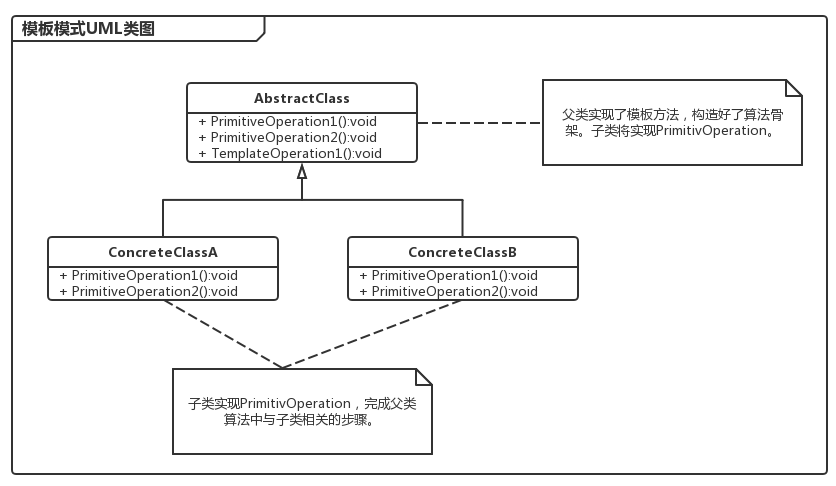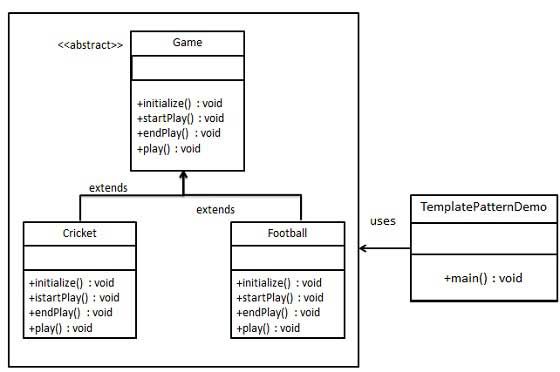【设计模式】【行为型模式】模板模式
概念
模板模式定义了一个算法的步骤,并允许子类为一个或多个步骤提供其实践方式。让子类在不改变算法架构的情况下,重新定义算法中的某些步骤。

抽象摸板角色:(抽象父类)
- 定义了一个或多个抽象操作,以便让子类实现
- 定义并实现了一个摸板方法
具体摸板角色:(具体实现类)
- 实现父类所定义的一个或多个抽象方法
- 每一个抽象摸板角色都可以有任意多个具体摸板角色与之对应
- 每一个具体摸板角色都可以给出这些抽象方法的不同实现
模板方法模式就是基于继承的代码复用技术的。在模板方法模式中,我们可以将相同部分的代码放在父类中,而将不同的代码放入不同的子类中。也就是说我们需要声明一个抽象的父类,将部分逻辑以具体方法以及具体构造函数的形式实现,然后声明一些抽象方法让子类来实现剩余的逻辑,不同的子类可以以不同的方式来实现这些逻辑。所以模板方法的模板其实就是一个普通的方法,只不过这个方法是将算法实现的步骤封装起来的。
模式中的方法种类:
- 抽象模板角色里提供完整的方法,它完成了所有派生类都要用到的一些基本功能。
- 抽象模板角色里只提供空方法,把功能全部留给派生类去实现。
- 抽象模板角色里只包含某些操作的默认实现,派生类里可以重新定义这些方法的实现。
- 抽象模板角色里模板方法,他是一个调用抽象方法,钩子方法以及具体方法的各种组合。
实例
创建一个定义操作的 Game 抽象类,其中,模板方法设置为 final,这样它就不会被重写。Cricket 和 Football 是扩展了 Game 的实体类,它们重写了抽象类的方法。
TemplatePatternDemo,我们的演示类使用 Game 来演示模板模式的用法。

步骤 1
创建一个抽象类,它的模板方法被设置为 final。
Game.java
public abstract class Game {
abstract void initialize();
abstract void startPlay();
abstract void endPlay();
//模板
public final void play(){
//初始化游戏
initialize();
//开始游戏
startPlay();
//结束游戏
endPlay();
}
}
步骤 2
创建扩展了上述类的实体类。
Cricket.java
public class Cricket extends Game {
@Override
void endPlay() {
System.out.println("Cricket Game Finished!");
}
@Override
void initialize() {
System.out.println("Cricket Game Initialized! Start playing.");
}
@Override
void startPlay() {
System.out.println("Cricket Game Started. Enjoy the game!");
}
}
Football.java
public class Football extends Game {
@Override
void endPlay() {
System.out.println("Football Game Finished!");
}
@Override
void initialize() {
System.out.println("Football Game Initialized! Start playing.");
}
@Override
void startPlay() {
System.out.println("Football Game Started. Enjoy the game!");
}
}
步骤 3
使用 Game 的模板方法 play() 来演示游戏的定义方式。
TemplatePatternDemo.java
public class TemplatePatternDemo {
public static void main(String[] args) {
Game game = new Cricket();
game.play();
System.out.println();
game = new Football();
game.play();
}
}
步骤 4
验证输出。
Cricket Game Initialized! Start playing.
Cricket Game Started. Enjoy the game!
Cricket Game Finished!
Football Game Initialized! Start playing.
Football Game Started. Enjoy the game!
Football Game Finished!
应用
在Spring中的AbstractApplicationContext的refresh方法中使用了模板模式。
public void refresh() throws BeansException, IllegalStateException {
synchronized (this.startupShutdownMonitor) {
// Prepare this context for refreshing.
prepareRefresh();
// Tell the subclass to refresh the internal bean factory.
ConfigurableListableBeanFactory beanFactory = obtainFreshBeanFactory();
// Prepare the bean factory for use in this context.
prepareBeanFactory(beanFactory);
try {
// Allows post-processing of the bean factory in context subclasses.
postProcessBeanFactory(beanFactory);
// Invoke factory processors registered as beans in the context.
invokeBeanFactoryPostProcessors(beanFactory);
// Register bean processors that intercept bean creation.
registerBeanPostProcessors(beanFactory);
// Initialize message source for this context.
initMessageSource();
// Initialize event multicaster for this context.
initApplicationEventMulticaster();
// Initialize other special beans in specific context subclasses.
onRefresh();
// Check for listener beans and register them.
registerListeners();
// Instantiate all remaining (non-lazy-init) singletons.
finishBeanFactoryInitialization(beanFactory);
// Last step: publish corresponding event.
finishRefresh();
}
catch (BeansException ex) {
// Destroy already created singletons to avoid dangling resources.
beanFactory.destroySingletons();
// Reset 'active' flag.
cancelRefresh(ex);
// Propagate exception to caller.
throw ex;
}
}
}
AbstractApplicationContext类中的refresh定义好了代码逻辑骨架,obtainFreshBeanFactory()方法中调用了refreshBeanFactory();,该方法在AbstractApplicationContext中是抽象方法,需要在子类中具体实现。
//AbstractApplicationContext
protected ConfigurableListableBeanFactory obtainFreshBeanFactory() {
refreshBeanFactory();
ConfigurableListableBeanFactory beanFactory = getBeanFactory();
if (logger.isInfoEnabled()) {
logger.info("Bean factory for application context [" + getId() + "]: " +
ObjectUtils.identityToString(beanFactory));
}
if (logger.isDebugEnabled()) {
logger.debug(beanFactory.getBeanDefinitionCount() + " beans defined in " + this);
}
return beanFactory;
}
protected abstract void refreshBeanFactory() throws BeansException, IllegalStateException;
查看AbstractApplicationContext的子类

最终类是FileSystemXmlApplicationContext,方法的具体实现在AbstractRefreshableApplicationContext中可以找到。

//AbstractRefreshableApplicationContext
protected final void refreshBeanFactory() throws BeansException {
if (hasBeanFactory()) {
destroyBeans();
closeBeanFactory();
}
try {
DefaultListableBeanFactory beanFactory = createBeanFactory();
customizeBeanFactory(beanFactory);
loadBeanDefinitions(beanFactory);
synchronized (this.beanFactoryMonitor) {
this.beanFactory = beanFactory;
}
}
catch (IOException ex) {
throw new ApplicationContextException(
"I/O error parsing XML document for application context [" + getDisplayName() + "]", ex);
}
}


